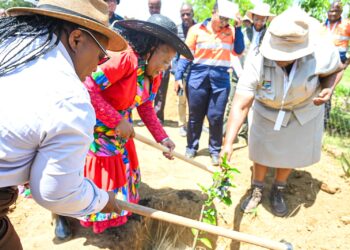The department of agriculture has emphasised the importance of bio-economy and advancing it in ways that promote inclusive economic growth, environmental stewardship, and social equity.
During the recent African Natural Capital Alliance (ANCA) Summit in Cape Town, minister John Steenhuisen said the bio-economy offers a truly transformative pathway to address the triple planetary crisis: climate change, biodiversity loss, and pollution.
“The bio-economy is the core solution. It enables resilient, responsible, and inclusive growth, enhances human wellbeing, and reduces poverty. Crucially, it supports climate mitigation and adaptation, biodiversity conservation, sustainable development, and is central to ensuring food security and nutrition.
“Yet, we face a critical inefficiency: according to the Centre for International Forestry Research World Agroforestry (CIFOR-ICRAF), Africa currently captures less than 10% of the value of its biomass. While there are undeniable reasons behind this, such as gaps in science and technology skills, infrastructure, innovation funding, and enabling policy, this disparity presents us with a remarkable opportunity,” he said.
Impact of bio-innovation on agriculture
The minister said it is critically important that government and private partners must invest strategically in adding value to the raw biomass that the continent produces, so that it can derive greater economic benefit for the people from agricultural productivity.
Related stories
- Bio-economy boom: Tech innovations for future growth
- Cut fertiliser waste and boost yields with smart farming
- How indigenous essential oils can drive jobs, food security
- Mastering seed germination: The key to a strong maize harvest
According to the department across the full agricultural value chain, bio-innovation can deliver a transformative impact. This includes:
- Crop and livestock improvement, including indigenous species, to withstand climate-related stresses;
- Agro-processing and integrated food and nutrition research;
- Development of animal vaccines and energy crops; expansion of bio-controls and biofertilisers;
- Growth in aquaculture, soil conservation, and water resource management;
- Critically, building high-value skills and capabilities and systems to drive agro-innovation. The bio-economy also brings circular economic principles to life, reminding us that “waste” is only waste if we waste it.
“Urgency is not just about seizing the opportunity of the bio-economy; it is about safeguarding it before it slips away. It is about investing in the ecological infrastructure that underpins both our current economy and the more sustainable one we aspire to build.
“We must accelerate innovation ecosystems that can commercialise and scale to have the necessary impacts. For the agricultural sector, financing the bio-economy on a large scale is not just a choice, it is the driving force behind significant transformation,” Steenhuisen said.
He noted that the benefits are clear, and there is a need to build resilience by investing in the tools that farmers need today, such as bio-inputs and climate-resilient crops.
“We create new revenue opportunities by supporting local infrastructure that transforms ‘waste’ into valuable products like bioplastics and bioenergy; and most importantly, we guarantee fair access to affordable, long-term capital for smallholders through innovative solutions like Bio-Bonds, ensuring that those who feed us become the primary beneficiaries of the wealth generated from their biological resources,” he said.
READ NEXT: SA vineyards poised for a strong 2026 harvest

















